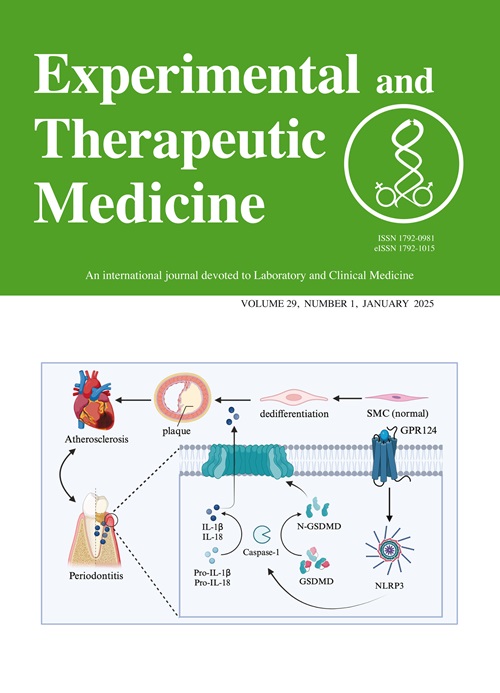SARS‑CoV‑2 infection and associated risk factors for clinical cases of cerebral venous thrombosis: A case series
IF 2.3
4区 医学
Q3 MEDICINE, RESEARCH & EXPERIMENTAL
引用次数: 0
Abstract
The present study focused on examining the association between the SARS‑CoV‑2 virus, responsible for the COVID‑19 pandemic, and cerebral venous thrombosis (CVT), a specific form of stroke that affects the brain's vessels and sinuses. While COVID‑19 is primarily recognized for its respiratory impact, it may also affect other organs, including the brain. One notable aspect of COVID‑19 is its association with coagulopathy, an abnormal condition of blood clotting. Coagulopathy may result in various complications, including neurological ones such as stroke. The study analyzed data obtained from patients admitted to a neurology department who had confirmed neurological pathologies along with COVID‑19. It specifically examined the cases of three patients with neurological conditions and COVID‑19, discussing their risk factors and how their conditions progressed clinically. The study concluded that COVID‑19 infection increases the likelihood of stroke, particularly within the initial 10 days after infection. CVT in particular is strongly linked to COVID‑19 and its underlying mechanisms involve immune systemic processes, cytokine storms, increased blood thickness, thrombogenesis, hypercoagulability and inflammation. The presence of SARS‑CoV‑2 infection may worsen the procoagulant cascade, thereby affecting the clinical condition of patients with CVT. The study underscores the importance of recognizing this uncommon but treatable consequence of COVID‑19 infection. Furthermore, it highlights the uniqueness of the study in evaluating COVID‑19 infection in patients with CVT from Romania and South‑East Europe. The findings support the existence of neurological disorders, including clotting complications in the brain's sinuses and vessels, in individuals infected with SARS‑CoV‑2. Several risk factors contribute to the development of CVT, such as infections, oral contraceptives, pregnancy, hematological disorders, trauma, autoimmune disorders and malignancies.脑静脉血栓临床病例的SARS - CoV - 2感染及其相关危险因素:一个病例系列
目前的研究重点是研究导致COVID - 19大流行的SARS - CoV - 2病毒与脑静脉血栓形成(CVT)之间的关系,CVT是一种影响脑血管和鼻窦的特定形式的中风。虽然COVID - 19主要因其对呼吸系统的影响而得到认可,但它也可能影响包括大脑在内的其他器官。COVID - 19的一个值得注意的方面是它与凝血病(一种异常的凝血状况)的关联。凝血功能障碍可导致各种并发症,包括神经系统并发症,如中风。该研究分析了从神经内科确诊患有神经病理学和COVID - 19的患者中获得的数据。它专门研究了三名患有神经系统疾病和COVID - 19的患者的病例,讨论了他们的风险因素以及他们的病情如何在临床进展。该研究得出结论,COVID - 19感染增加了中风的可能性,特别是在感染后的最初10天内。CVT尤其与COVID - 19密切相关,其潜在机制涉及免疫系统过程、细胞因子风暴、血液厚度增加、血栓形成、高凝性和炎症。SARS - CoV - 2感染可使促凝剂级联恶化,从而影响CVT患者的临床状况。该研究强调了认识到COVID - 19感染这种不常见但可治疗的后果的重要性。此外,它还强调了该研究在评估罗马尼亚和东南欧CVT患者的COVID - 19感染方面的独特性。这些发现支持了SARS - CoV - 2感染者存在神经系统疾病,包括大脑鼻窦和血管中的凝血并发症。一些危险因素有助于CVT的发展,如感染、口服避孕药、妊娠、血液系统疾病、创伤、自身免疫性疾病和恶性肿瘤。
本文章由计算机程序翻译,如有差异,请以英文原文为准。
求助全文
约1分钟内获得全文
求助全文
来源期刊

Experimental and therapeutic medicine
MEDICINE, RESEARCH & EXPERIMENTAL-
CiteScore
1.50
自引率
0.00%
发文量
570
审稿时长
1 months
期刊介绍:
 求助内容:
求助内容: 应助结果提醒方式:
应助结果提醒方式:


